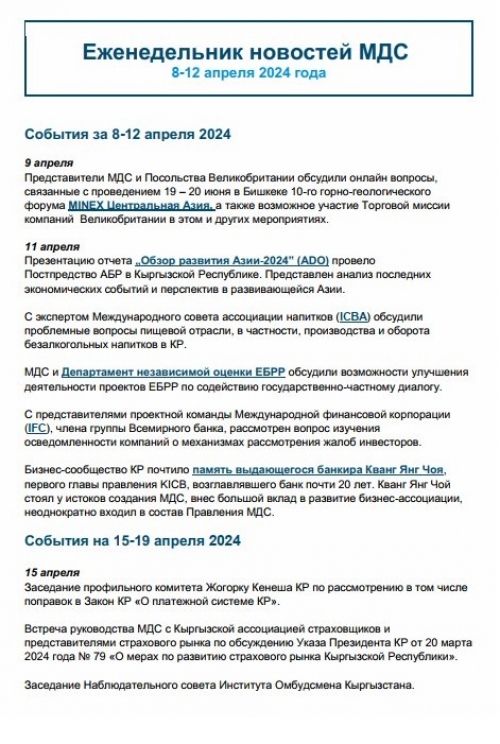Analysis /
Articles /
IBC supports Government initiatives to combat corruption
Law enforcement agencies should be an example of honesty and honor, Prime Minister of Kyrgyzstan Temir Sariyev said at a meeting of Kyrgyzstan’s Council on Security and Law Enforcement. The Premier advised heads of law enforcement agencies to get rid of dishonest workers and not to employ them anymore.
Improving law enforcement agencies’ image
According to the National Security Committee of Kyrgyzstan, the damage from corruption-related crimes was 1.7 billion soms in 2014. Most criminal cases were related to the activities of law enforcement agencies and local authorities. The most common corruption crimes are malpractice and extortion.
According to the quarterly survey conducted by the Bishkek-based International Business Council (IBC), corruption is among the top problems hindering the development of business in the country.
There are facts of unjustified inspections of businesses, including by non-authorized bodies. Instead of fighting crime, law enforcement officials continue harassing business, creating unbearable conditions for it and intimidating entrepreneurs.
The Prime Minister admitted that Kyrgyz citizens are not confident of their safety. Criminal groups do not stop trying to influence the business. In some cities and regions, criminal groups feel at ease and make businessmen “to register” (to give regularly a certain amount of money). This negatively affects the economy and the image of the authorities, the Premier concluded.
The violations of law enforcement bodies include concealment of crimes, the pressure on victims of crimes so that they take their evidence back. The Prosecutor's Office is investigating dozens of criminal cases against officials. Since the beginning of 2015, 47 police officers have been brought to justice.
There are underground casinos in Kyrgyzstan, while their activities are prohibited by law. The Prime Minister inquired why the State Service for Combating Economic Crimes did not close them. Maybe those casinos have high-ranking patrons, he suggested.
Of 433 criminal proceedings initiated last year, only 71 cases, or one in six, were sent to courts. “If we fail to clean up the law enforcement agencies, we’ll have nothing to say about the rule of law and order in the country,” Sariyev stressed.
The law enforcement agencies are not a punitive tool of the state, but a mechanism for providing social services and security for citizens, concluded the Premier.
Vision of business
"The International Business Council believes that identifying corruption at its early stage will warn people against illegal acts,” IBC Executive Director Temirbek Azhykulov said. “Corruption is difficult to fight without the support of the population; it is therefore necessary to raise intolerance to corruption in society, starting from kindergartens to schools to public services and other organizations."
If corruption is perceived negatively at all levels — from top officials to ordinary people, then this phenomenon will decrease from within. People will not give and take bribes for their moral convictions.
"Clear legislation will help fight corruption, leaving no loopholes for evading the law,” the IBC head said. “It is necessary to eliminate gaps and contradictions in the legislation, so that less possibility to remain for interpreting the law in favor of this or that party."
E-procurement introduced
For many years, the public and the business community had a lot of complaints about the public procurement system. This area has always been “a dark side of the Moon” and required improvement.
According to the Ministry of Internal Affairs of Kyrgyzstan, in the first three months of 2015 alone, 22 criminal offenses have been revealed that have caused 700 million soms in damage to the state.
It is vital to make the public procurement process more transparent. A project on electronic procurement was launched with the support of the Asian Development Bank but there was no legislative basis for it. A new version of the law on public procurement has been drafted and approved by the Parliament and President. The law came into force on May 14.
By July 1, all public procurement participants should use an electronic portal. About 700 organizations and enterprises will post their procurement plans on the e-portal.
The new law on public procurement excludes direct contact with the Department for procurement. Among the innovations are the mandatory declaration form that guarantees a competitive bid and a framework agreement.
To settle disputes during auctions, an interdepartmental commission will be set up.
The E-portal is ready to operate, and there are organizations that have registered on the portal, but they still continue trading in the paper form. Currently, nobody will be punished, but government employees and the business community will be trained in using the portal.























